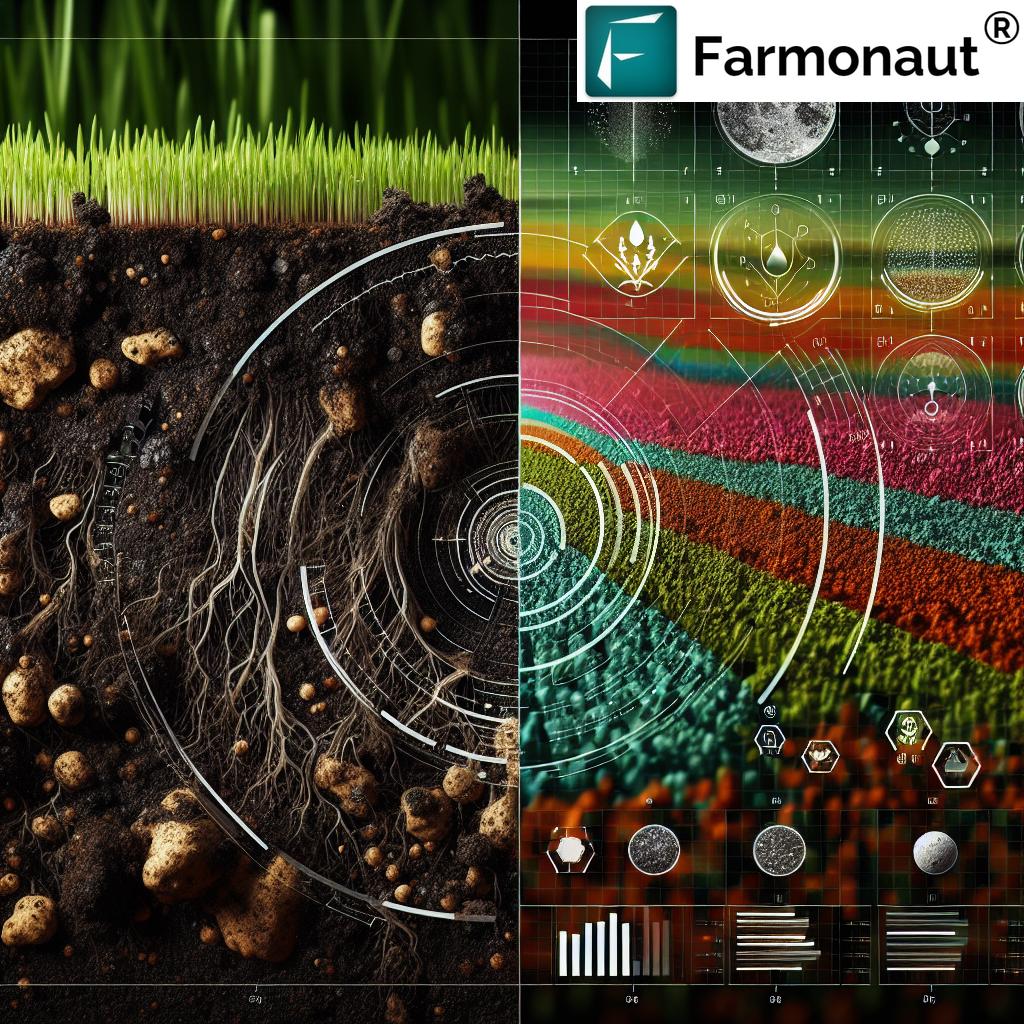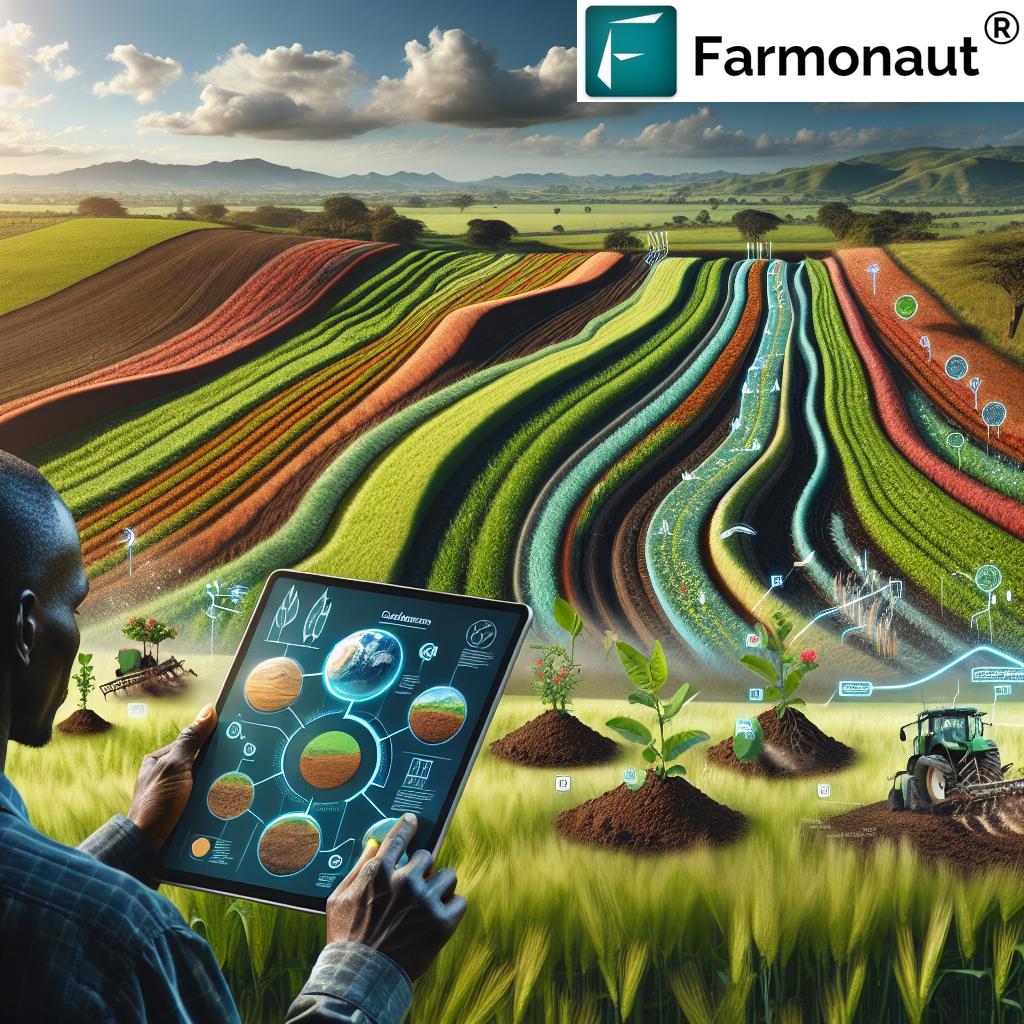Mastering Soil Science: Essential Terminology for Sustainable Agriculture and Precision Farming with Farmonaut
Soil science is the foundation of sustainable agriculture and precision farming. At Farmonaut, we recognize the critical importance of understanding soil terminology and concepts to optimize crop production and promote environmentally friendly farming practices. In this comprehensive guide, we’ll delve into the world of soil science, exploring key terms, classification systems, and the role of technology in modern agriculture.

“Soil pH, ranging from 0 to 14, is a critical factor in determining nutrient availability for crops.”
Understanding Soil Science Terminology
Soil science terminology forms the backbone of agricultural knowledge. Let’s explore some essential terms and concepts that every farmer, agronomist, and agriculture enthusiast should know:
- Soil Structure: The arrangement of soil particles into aggregates or peds, which affects water movement, root growth, and aeration.
- Soil Texture: The proportion of sand, silt, and clay particles in soil, influencing water retention and nutrient availability.
- Soil Horizons: Distinct layers within a soil profile, each with unique characteristics and functions.
- Soil Organic Matter: Decomposed plant and animal materials that improve soil structure, water retention, and nutrient availability.
- Soil pH: A measure of soil acidity or alkalinity, crucial for nutrient availability and microbial activity.
Understanding these terms is crucial for effective soil management and crop production. At Farmonaut, we integrate this knowledge into our precision agriculture technology, helping farmers make informed decisions based on accurate soil data.
Soil Classification Systems
Soil classification systems provide a standardized way to categorize and understand different soil types. The most widely used system in the United States is the USDA Soil Taxonomy. This system classifies soils based on their properties and characteristics, including:
- Soil order (e.g., Alfisols, Mollisols, Vertisols)
- Suborder
- Great group
- Subgroup
- Family
- Series
Understanding soil classification helps farmers and agronomists predict soil behavior, crop suitability, and management requirements. Our Farmonaut API incorporates soil classification data to provide tailored recommendations for different soil types.
Soil Fertility Management
Effective soil fertility management is crucial for sustainable agriculture. It involves maintaining optimal levels of essential nutrients in the soil to support plant growth. Key aspects of soil fertility management include:
- Nutrient cycling
- Fertilizer application
- Crop rotation
- Cover cropping
- Organic matter management
At Farmonaut, we use remote sensing in agriculture to monitor soil health and provide real-time recommendations for fertility management. Our technology helps farmers optimize fertilizer use, reduce costs, and minimize environmental impact.

Agricultural Soil Analysis
Agricultural soil analysis is a critical tool for assessing soil health and fertility. It involves testing soil samples to determine various properties, including:
- Soil pH and nutrient levels
- Organic matter content
- Cation Exchange Capacity (CEC)
- Soil texture
- Bulk density
Regular soil analysis helps farmers make informed decisions about fertilizer application, liming, and other soil management practices. Farmonaut’s API Developer Docs provide guidance on integrating soil analysis data into farm management systems.
Sustainable Soil Practices
Sustainable soil practices are essential for long-term agricultural productivity and environmental conservation. These practices include:
- Conservation tillage
- Crop rotation
- Cover cropping
- Integrated pest management
- Precision agriculture
By implementing these practices, farmers can improve soil health, reduce erosion, and enhance biodiversity. Farmonaut’s precision agriculture tools support the adoption of sustainable soil practices by providing accurate, timely data on soil conditions.
Soil Erosion Prevention
Soil erosion is a significant threat to agricultural productivity and environmental health. Effective erosion prevention techniques include:
- Contour plowing
- Terracing
- Strip cropping
- Windbreaks
- Mulching
Our Farmonaut Android app and iOS app provide tools for monitoring soil erosion risk and implementing prevention strategies.
“Soil scientists recognize six main horizons (layers) in a typical soil profile, each with unique characteristics.”
Precision Agriculture Technology
Precision agriculture technology revolutionizes farming by enabling data-driven decision-making. Key components of precision agriculture include:
- GPS-guided machinery
- Remote sensing
- Soil mapping
- Variable rate technology
- Yield monitoring
Farmonaut’s platform integrates these technologies to provide farmers with comprehensive farm management solutions. Our web app offers real-time insights into crop health, soil moisture, and other critical parameters.
Soil Health Indicators
Soil health indicators are measurable properties that reflect the overall condition of the soil. Common indicators include:
- Organic matter content
- Soil structure and aggregation
- Water infiltration rate
- Biological activity (e.g., earthworm populations)
- Nutrient cycling efficiency
Monitoring these indicators helps farmers assess the impact of their management practices and make necessary adjustments. Farmonaut’s technology incorporates soil health indicators into its analysis, providing farmers with a comprehensive view of their soil’s condition.
Remote Sensing in Agriculture
Remote sensing technologies, such as satellite imagery and drone-based sensors, play a crucial role in modern agriculture. These tools provide valuable information on:
- Crop health and vigor
- Soil moisture levels
- Pest and disease outbreaks
- Nutrient deficiencies
- Yield estimation
Farmonaut leverages advanced remote sensing techniques to deliver accurate, timely information to farmers. Our platform processes satellite data to generate actionable insights for improved farm management.
Soil Science Terminology Glossary
| Term | Definition/Explanation |
|---|---|
| Soil pH | A measure of soil acidity or alkalinity on a scale of 0 to 14, affecting nutrient availability and microbial activity. |
| Cation Exchange Capacity (CEC) | The total capacity of a soil to hold exchangeable cations, influencing nutrient retention and availability. |
| Soil Structure | The arrangement of soil particles into aggregates or peds, affecting water movement and root growth. |
| Soil Horizons | Distinct layers within a soil profile, each with unique characteristics and functions. |
| Soil Organic Matter | Decomposed plant and animal materials that improve soil structure, water retention, and nutrient availability. |
| Bulk Density | The mass of dry soil per unit volume, indicating soil compaction and porosity. |
| Soil Texture | The proportion of sand, silt, and clay particles in soil, influencing water retention and nutrient availability. |
| Soil Porosity | The volume of pore space in soil, affecting water and air movement. |
| Soil Erosion | The removal of topsoil by wind, water, or other natural processes, often accelerated by human activities. |
| Nutrient Cycling | The continuous movement and transformation of nutrients within the soil-plant-atmosphere system. |
The Role of Farmonaut in Precision Agriculture
Farmonaut’s advanced satellite-based farm management solutions play a crucial role in revolutionizing precision agriculture. Our platform integrates cutting-edge technology with traditional farming practices to provide farmers with valuable insights and tools for optimizing their operations.
- Satellite-Based Crop Health Monitoring: We use multispectral satellite images to monitor crop health, providing real-time data on vegetation health (NDVI) and soil moisture levels.
- AI-Powered Advisory System: Our Jeevn AI system delivers personalized farm advice, weather forecasts, and expert crop management strategies.
- Blockchain-Based Traceability: We offer traceability solutions that enhance transparency and trust in agricultural supply chains.
- Resource Management Tools: Our platform includes features for fleet management and carbon footprint tracking, helping agribusinesses optimize their operations and reduce environmental impact.
By leveraging these technologies, Farmonaut empowers farmers to make data-driven decisions, improve crop yields, and adopt sustainable farming practices.
Frequently Asked Questions
- What is soil science?
Soil science is the study of soil as a natural resource, including its formation, classification, and properties. It encompasses physical, chemical, and biological aspects of soil and its role in supporting plant growth and ecosystem functions. - Why is soil pH important in agriculture?
Soil pH affects nutrient availability, microbial activity, and overall plant health. Most crops prefer a slightly acidic to neutral pH range (6.0-7.0) for optimal growth and nutrient uptake. - How does precision agriculture benefit farmers?
Precision agriculture helps farmers optimize resource use, reduce costs, improve crop yields, and minimize environmental impact by providing data-driven insights and targeted management strategies. - What are the main soil health indicators?
Key soil health indicators include organic matter content, soil structure, water infiltration rate, biological activity, and nutrient cycling efficiency. - How does Farmonaut use satellite imagery in agriculture?
Farmonaut processes multispectral satellite images to monitor crop health, soil moisture levels, and other critical parameters. This data is used to generate actionable insights for improved farm management.
Conclusion
Mastering soil science terminology and understanding the principles of sustainable agriculture are crucial for modern farmers and agronomists. By leveraging precision agriculture technologies and implementing sustainable soil practices, we can optimize crop production while preserving our valuable soil resources for future generations.
At Farmonaut, we’re committed to making precision agriculture accessible and affordable for farmers worldwide. Our platform integrates advanced satellite imagery, AI-powered analytics, and user-friendly tools to help farmers make informed decisions and improve their agricultural practices.
We invite you to explore our services and join the precision agriculture revolution. Whether you’re a small-scale farmer or a large agribusiness, Farmonaut has the tools and expertise to help you succeed in the ever-evolving world of modern agriculture.
Ready to take your farming to the next level? Check out our subscription options below and start your journey towards more efficient, sustainable, and profitable agriculture with Farmonaut.
Join us in revolutionizing agriculture through science, technology, and sustainable practices. Together, we can build a more resilient and productive agricultural future.






